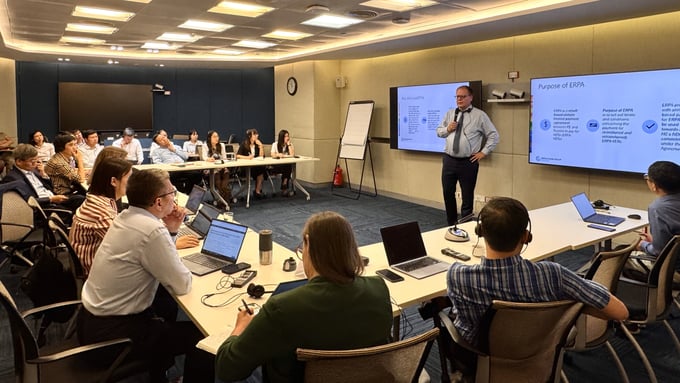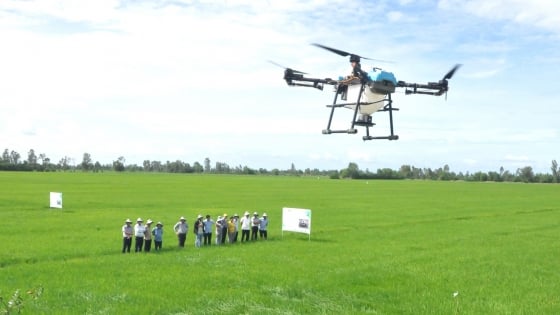November 26, 2025 | 17:53 GMT +7
November 26, 2025 | 17:53 GMT +7
Hotline: 0913.378.918
November 26, 2025 | 17:53 GMT +7
Hotline: 0913.378.918

Workshop on the legal elements of the Transformative Carbon Asset Facility (TCAF) organized by the World Bank. Photo: Quynh Chi.
The World Bank (WB) conducted a workshop on September 24 to introduce and disseminate the legal agreements associated with the Project for 1 million hectares of high-quality, low-emission rice (the Project). The workshop focused on the legal components of the Transformative Carbon Asset Facility (TCAF) Fund.
The implementation of a payment mechanism for emission reduction efforts in agriculture must be based on specific results, according to specialists from the International Bank for Reconstruction and Development (IBRD). The only way to convince producers to participate in the Project is to demonstrate the value and benefits of the emission reduction measures they implement.
The World Bank suggests that Vietnam participate in the carbon market, as this will provide access to new financial resources and facilitate the payment of carbon credits based on the emissions reductions accomplished in agricultural production.
Furthermore, the carbon measurement system will reinforce Vietnam's strategy to establish a rice brand that is both high-quality and low-emission, thereby increasing the market value of Vietnamese rice and promoting environmentally responsible agricultural production.
Nevertheless, Vietnam must also comprehend the legal hazards and obligations that come with its participation in these international agreements. The WB is assisting Vietnam in the preparation of information to facilitate the negotiation and signing of TCAF agreements.
To support the 1 million hectares rice project, the TCAF board recently formally approved the Project Identification Note (PIN). Consequently, TCAF has authorized a total funding of USD 33 million (with the potential to increase to USD 40 million) for the Project. Additionally, USD 2 million has been allocated from a technical support fund ran by the World Bank to aid in the preparation and readiness to participate in the emission reduction mechanism.
Markus Pohlmann, senior legal advisor, underscored that the full amount would be disbursed only after the Project reaches 50% of its target area.
Markus emphasized the significance of implementing a payment policy for farmers who pledge to cultivate rice with low emissions: "Our primary objective is to assist Vietnam in maximizing the potential of international financial agreements, not only to reduce emissions but also to capitalize on opportunities in the carbon market."

The World Bank recommends that Vietnam should participate in the carbon market. Photo: Kim Anh.
The parties will continue to engage in discussions regarding the value of credits and payment conditions in the Emission Reduction Purchase Agreement (ERPA) by May 2025. TCAF will prioritize carbon credit payments to regions that adhere to international standards for alternate soaking and drying.
"In this process, Vietnam will have enough time to prepare mechanisms and policies without needing to make significant adjustments in terms of production technology and organization," Markus concluded.
WB specialists introduced financial instruments, including the Mitigation Outcome Purchase Agreement (MOPA) and the Emission Reduction Payment Agreement (ERPA). The quantity of emissions measured and verified will determine the payments that farmers and production units receive.
The WB calls for the involvement of ministries and sectors to support the promotion of emission reduction payment policies in rice production within the Project's framework. The core team of the World Bank is committed to the Ministry of Agriculture and Rural Development (MARD) serving as the focal point for the design and operation of the Measurement, Reporting, and Verification (MRV) system. Additionally, the team is committed to adapting principles and methodologies to accommodate domestic conditions.
Representatives from the Ministry of Natural Resources and Environment (MONRE), the Ministry of Finance, and MARD asked WB experts during the workshop regarding the requisite procedures for signing the ERPA and MOPA agreements within the TCAF program framework.
Vietnam has been researching the two-stage TCAF's legal framework, as well as the interrelationships between the legal documents. In the interim, the World Bank furnished the Government of Vietnam with the requisite information to facilitate the preparation for negotiations and the execution of legal agreements with TCAF.
TCAF is committed to providing payments for Verified Emission Reductions (VER) from emission reduction programs. Furthermore, Vietnam is entitled to retain surplus VER for the purpose of domestic emission reduction commitments or for trade with organizations, enterprises, and governments that are not part of the TCAF.
The iCRAFT (Innovative Carbon Resources for Energy Transition) project in Uzbekistan, which was signed in October 2023, is a notable example. This is the World Bank's inaugural emission reduction payment policy in Central Asia, which serves as an illustration of the potential for carbon financing solutions to facilitate sustainable energy transitions.
The signing of ERPA and MOPA will assist Vietnam in establishing a strong foundation for the implementation of emission reduction policies in rice production, as well as the creation of carbon assets that can be utilized to fulfill national climate commitments (NDC).

(VAN) The Disaster Prevention Community Fund has mobilized resources to install automatic rain gauge and flood warning stations, helping localities proactively respond to natural disasters more effectively.

(VAN) Thanh Hoa province has substantial potential to supply carbon credits, opening opportunities for green economic development, enhancing agriculture and forestry value.
/2025/11/25/1741-0-nongnghiep-221736.jpg)
(VAN) The application of AI helps identify emission sources and assess air pollution developments, thereby supporting management agencies in issuing timely and appropriate control policies.

(VAN) Viet Nam will develop its carbon market not only by prioritizing transaction volumes but also by transitioning to a low-emission economy.
/2025/11/25/3413-1-171953_261.jpg)
(VAN) Experts from the Vietnam Academy of Science and Technology have conducted surveys to identify the causes of landslides in Lam Dong province and propose natural disaster prevention solutions.

(VAN) The HNT reservoir operation support system, developed by WeatherPlus in collaboration with Kyushu Electric Power, enables real-time rainfall forecasting, inflow forecasting, and flood-release simulations.

(VAN) Dr. Cao Duc Phat stated that the localization of early natural disaster warning technologies will help meet practical requirements and create favorable conditions for domestic research institutions and businesses to develop.